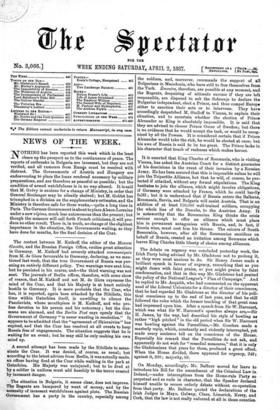The debate on urgency was concluded yesterday week, the Irish
Party being advised by Mr. Gladstone not to prolong it, as they were most anxious to do. Sir Henry James made a brilliant speech in favour of urgency, remarking that as you might damn with faint praise, so you might praise by faint condemnation, and that in this way Mr. Gladstone had praised the policy of the National League's "Plan of Campaign." And he replied to Mr. Asquith, who had commented on the apparent need of the Liberal Unionists for a director of their consciences, that he had regarded Mr. Gladstone as the director of his poli- tical conscience up to the end of last year, and that he still followed the rules which the former teaching of that great man had impressed upon him. After a speech from Sir W. Harcourt, which was what Sir W. Harcourt's speeches always are,—Sir H. James, by the way, had described his style of bowling as rather "high pitched" in the old period when Sir W. Harcourt was bowling against the Parnellites,—Mr. Gosohen made a masterly reply, which, constantly and violently interrupted, yet made every sentence tell on the conscience of the House. Especially his remark that the Parnellites do not ask, and apparently do not wish for "remedial measures," that it is only the Gladstonians that press for them, produced a great effect. When the House divided, there appeared for urgency, 349; against it, 260; majority, 89.


































